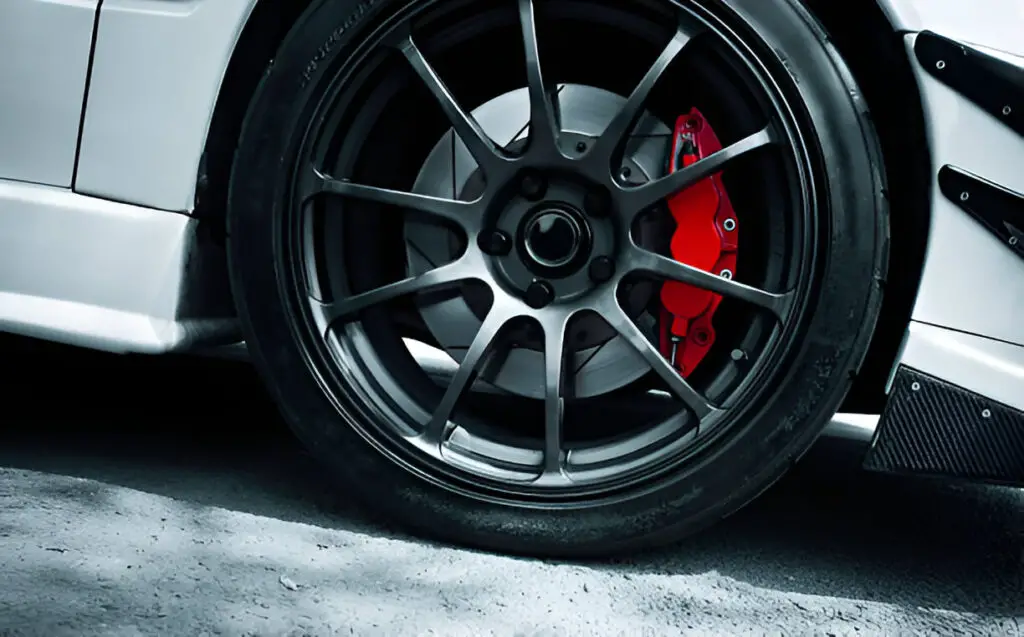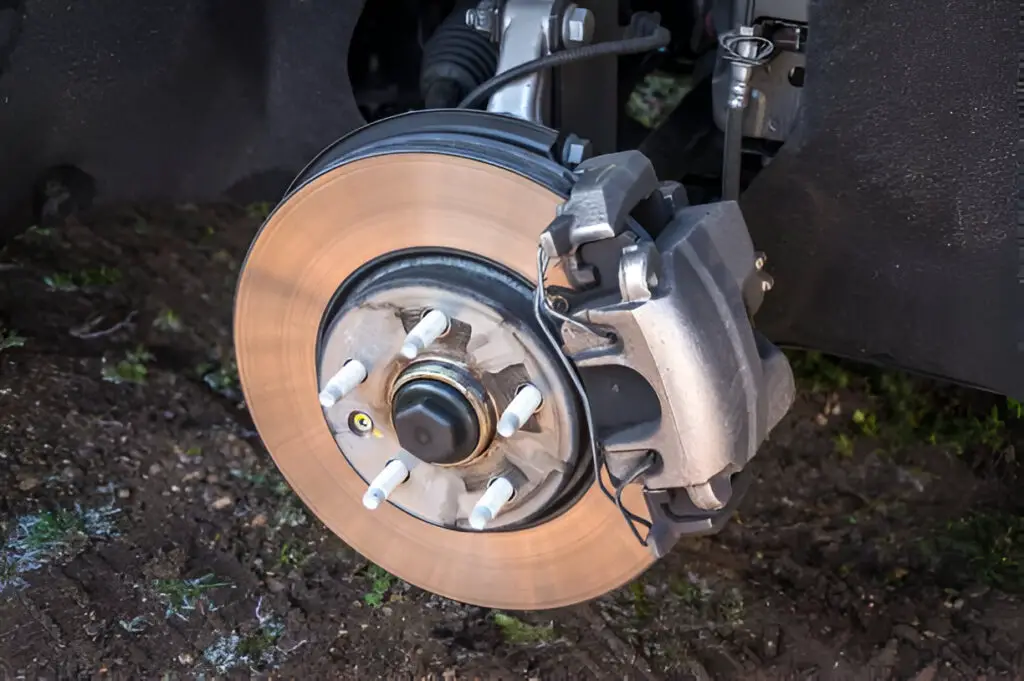Brake calipers may be covered under a basic warranty if they fail due to a defect, but are usually not included in powertrain warranties. Coverage for wear and tear or damage from external factors is typically excluded. Always check your specific warranty terms for details.
When purchasing a vehicle, understanding what is covered under the manufacturer’s warranty is crucial, especially for critical components like the braking system. The brake system is vital for the safety of both the driver and passengers. Among the essential components of the braking system, brake calipers often raise questions regarding warranty coverage. Brake calipers play a pivotal role in the operation of disc brakes, which are used in most modern vehicles.
In this blog post, we’ll dive deep into brake calipers and warranties, the types of warranties that may cover brake calipers, and some considerations to keep in mind.

Contents
Brake Caliper and Its Role in the Braking System
Before we discuss whether brake calipers are covered under warranty, it’s essential to understand what brake calipers are and their importance in a vehicle’s braking system.
What Are Brake Calipers?
A brake caliper is part of the disc brake system and plays a critical role in ensuring your vehicle can stop when needed. The caliper is the component that houses the brake pads and pistons. When you apply pressure to the brake pedal, brake fluid is forced into the caliper, pushing the pistons and causing the brake pads to squeeze against the rotor. This action creates the friction necessary to slow or stop the vehicle.
There are two main types of brake calipers:
- Floating Calipers: These calipers have one or two pistons on only one side of the rotor. The caliper itself can “float,” meaning it moves to apply pressure on both sides of the rotor.
- Fixed Calipers: These have pistons on both sides of the rotor, and the caliper itself does not move. This setup often provides more consistent braking performance.
Due to the essential nature of brake calipers in the braking process, they are subject to wear and tear over time. This leads to questions about whether they are covered under vehicle warranties.
Types of Warranties
Most new vehicles come with warranties to protect buyers from defects and unexpected repairs. These warranties typically cover a wide array of vehicle components, but the specifics depend on the type of warranty and its terms. The most common types of warranties that might cover brake calipers include:
- Basic (Bumper-to-Bumper) Warranty
- Powertrain Warranty
- Brake-Specific Warranty
- Extended Warranty
- Wear-and-Tear or Maintenance Coverage
Let’s break down each warranty type to see whether it may cover brake calipers.
1. Basic (Bumper-to-Bumper) Warranty
A bumper-to-bumper warranty typically covers nearly every part of the vehicle, including electronics, body, interior, and sometimes even the brake system. However, most bumper-to-bumper warranties specifically exclude parts that are subject to regular wear and tear, such as brake pads, rotors, and tires.
Brake calipers, however, are not typically classified as wear-and-tear items. Therefore, they may be covered under the bumper-to-bumper warranty if the failure is due to a defect in materials or workmanship. The length of this warranty varies by manufacturer but typically lasts for 3 years or 36,000 miles, whichever comes first.
2. Powertrain Warranty
The powertrain warranty covers essential components related to the engine and transmission. This type of warranty typically does not cover the braking system, as it focuses on mechanical parts that make the car move. Brake calipers are not considered part of the powertrain, and caliper repairs are rarely, if ever, covered under a powertrain warranty.
3. Brake-Specific Warranty
Some vehicle manufacturers or third-party warranty providers offer a brake-specific warranty, either as a part of a comprehensive plan or as an add-on. These warranties often cover the entire braking system, including calipers, pads, rotors, and brake lines. The coverage terms and limits for these types of warranties can vary significantly depending on the provider and the plan chosen.
If your vehicle has a brake-specific warranty, it is highly likely that brake calipers are covered, but it’s crucial to check the fine print of your specific plan to be sure.
4. Extended Warranty
An extended warranty is an optional protection plan that can be purchased once the original warranty expires. Extended warranties can range from covering almost all vehicle parts (like the bumper-to-bumper warranty) to more specific coverage (like powertrain or brake components).
Whether brake calipers are covered under an extended warranty depends entirely on the terms of the contract. Some extended warranties cover the braking system, while others focus solely on major mechanical components. Be sure to carefully review what is covered by an extended warranty before purchasing.
5. Wear-and-Tear or Maintenance Coverage
Some warranties specifically address wear-and-tear items or offer maintenance coverage for routine services like brake pad replacement, oil changes, and tire rotations. However, these plans typically do not cover parts like brake calipers unless they fail due to a manufacturing defect.
Brake calipers are designed to last a long time and are not considered typical wear items, like pads or rotors. If a defect causes premature failure, they could be covered under this type of warranty.
When Brake Calipers May Not Be Covered
Even if brake calipers are covered under a warranty, there are several circumstances where they may not be eligible for coverage. Here are some common exclusions:
- Normal Wear and Tear: If the calipers are failing due to normal aging or wear, they may not be covered, as many warranties exclude wear-and-tear parts.
- Lack of Maintenance: Regular brake maintenance, such as changing brake pads and flushing brake fluid, is essential. If the failure of the calipers is due to a lack of maintenance, the warranty may not cover it.
- Damage Caused by External Factors: If the brake calipers are damaged due to road hazards, accidents, or improper installation of aftermarket parts, the warranty is unlikely to cover the repair.
- Modifications: Installing aftermarket brake components can void certain parts of your warranty. Be sure to consult your warranty terms before making any modifications to the brake system.

Frequently Asked Questions
Here are some FAQs about brake calipers warranty –
1. Are brake calipers covered under a basic warranty?
Yes, brake calipers may be covered under a basic (bumper-to-bumper) warranty if the failure is due to a manufacturing defect. However, wear and tear may not be covered.
2. Are brake calipers covered under a powertrain warranty?
No, powertrain warranties typically do not cover brake calipers, as they focus on engine and transmission components.
3. How long do brake calipers usually last?
Brake calipers generally last between 75,000 and 100,000 miles, depending on driving habits and maintenance.
4. Can extended warranties cover brake calipers?
Some extended warranties may cover brake calipers, but it depends on the specific terms of the contract. Be sure to review the warranty carefully.
5. What happens if my brake calipers fail due to lack of maintenance?
If your brake calipers fail due to a lack of maintenance, the warranty is unlikely to cover the repair. Regular maintenance is key to avoiding this issue.
Final Thoughts
In summary, brake calipers are an essential part of your vehicle’s braking system, and whether they are covered under warranty depends on the type of warranty you have and the circumstances of the failure. In most cases, a bumper-to-bumper warranty will cover calipers if they fail due to a defect. However, powertrain warranties do not typically cover brake components, and extended warranties may or may not include brake caliper coverage, depending on the terms.
Always review your warranty’s terms and conditions to understand what is covered, and maintain your vehicle according to the manufacturer’s recommendations to avoid voiding your warranty. If you’re unsure, consult your dealership or warranty provider for clarification.